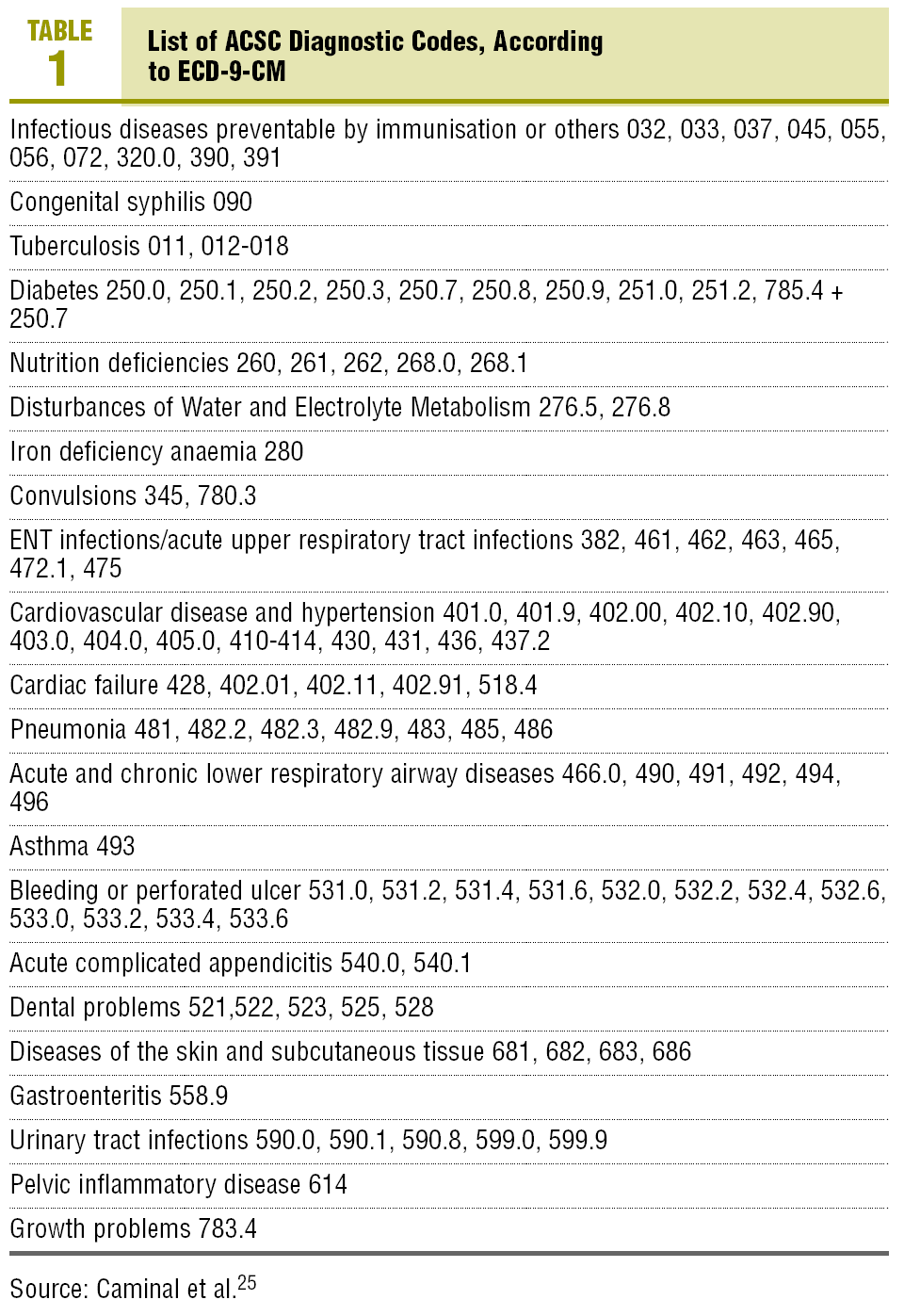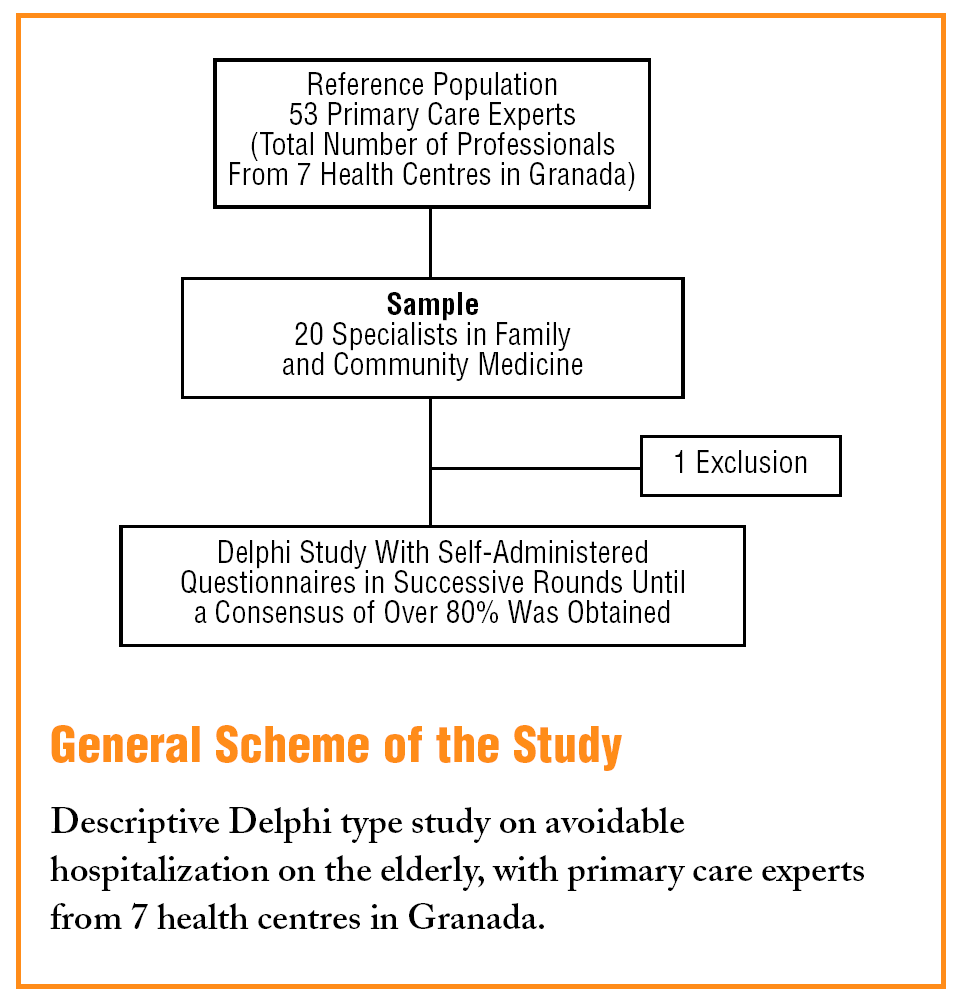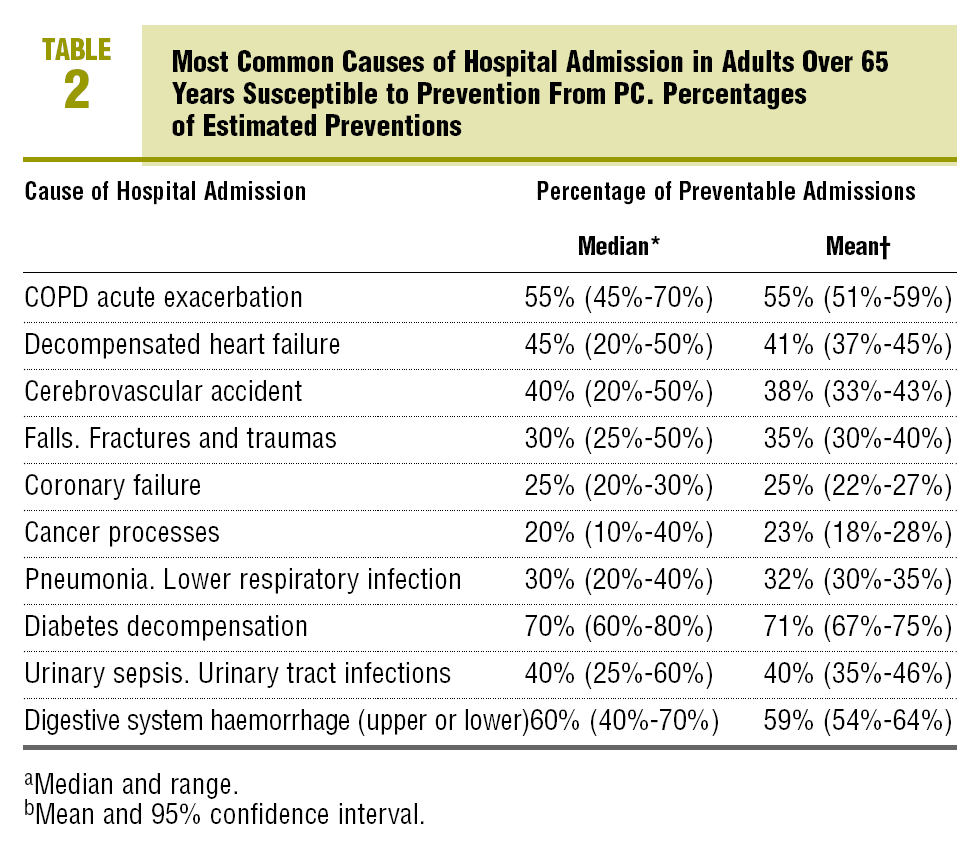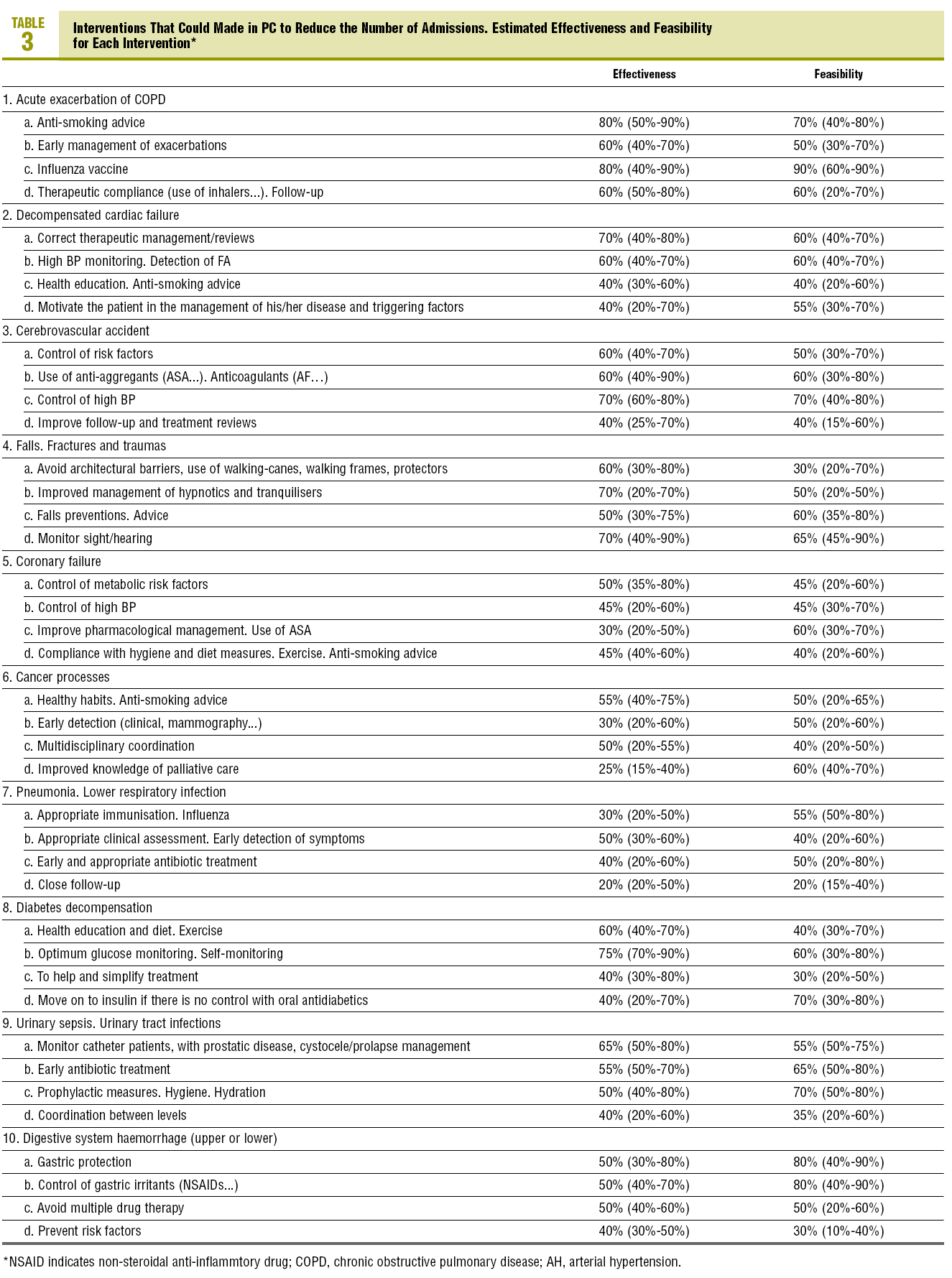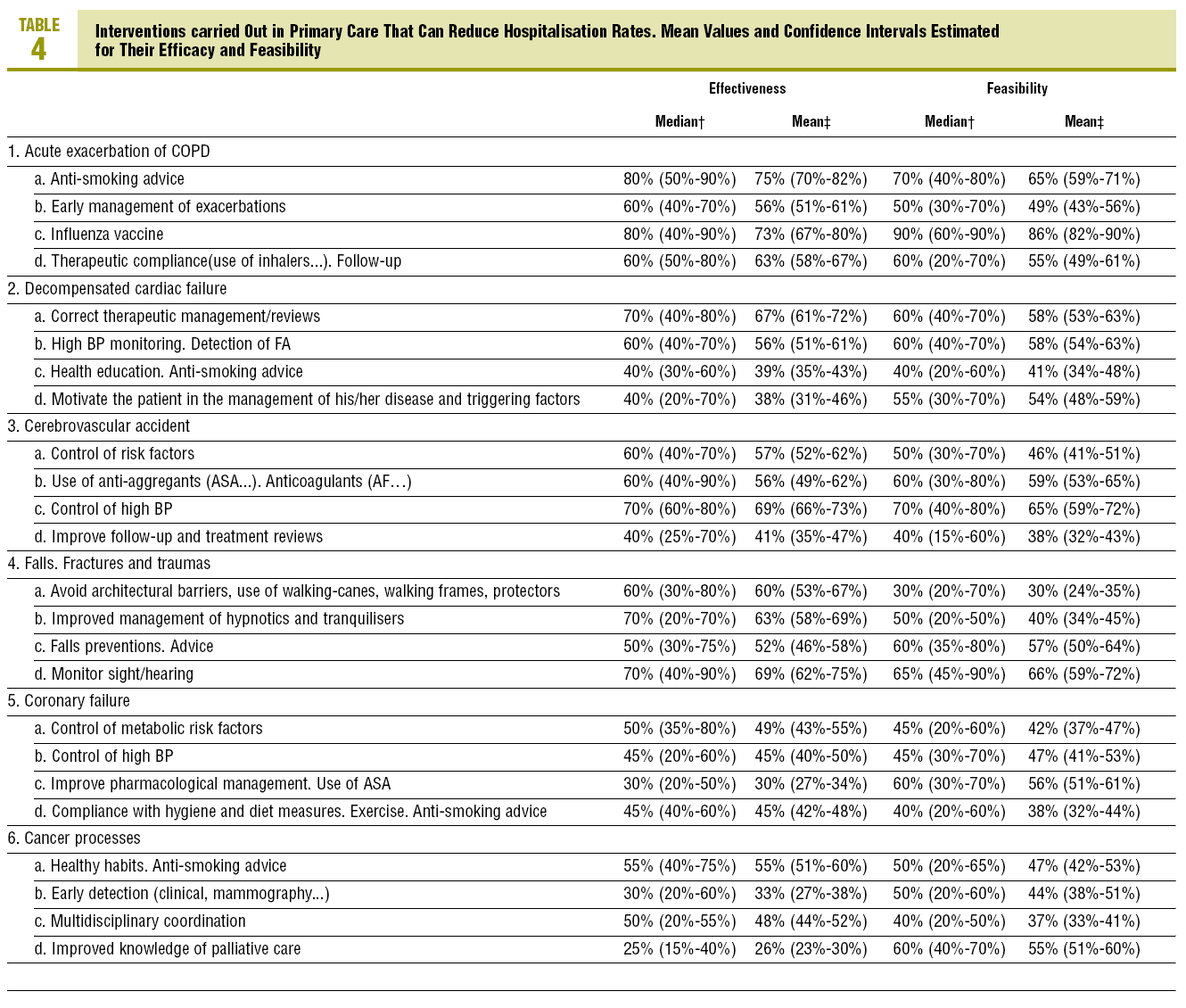Introduction
The concept of hospitalisation due to ambulatory care sensitive conditions (ACSC) emerged in the United States as an access indicator of the population to primary care (PC).1-3 Its application highlighted higher hospitalisation figures in areas with a low socioeconomic level and in population groups with lower health insurance cover.4,5
ACSC are defined as a group of hospital discharge diagnosis codes (Table 1).6 In Spain, where health cover is universal, they have been proposed as indicators of PC quality.7,8
The inclusion of a wide range of diagnoses could reduce the sensitivity of this indicator to detect differences in the quality of services. There are studies, such as that of Gill et al,9 who found a significant association between primary care and hospitalisations due to chronic ACSC (COPD, cardiac failure, diabetes, hypertension...) but did not find any for the acute ACSC (pneumonia, gastroenteritis...). Likewise, the effectiveness of intervention could be linked to age, or the presence of comorbidities. It would be worthwhile to use an individual approach to health problems, including identifying the specific interventions that could have prevented the patient being hospitalised.10,11
People over 65 years make up 17% of the population (a proportion that is increasing, particularly octogenarians who make up 3.9% of the population and will reach 10% in 205012), but consume 29% of health costs.13 This population group uses a large amount of health resources: 35%-40% of acute hospital stays, 40%-50% of the total activity of the PC doctor, more than 50% of the prescriptions,14,15 with a daily consumption, which, in the elderly, varies between 2 and 3 drugs per day, and more than 75% of these chronically.16
The objective of this study is to find out the perception of PC professionals on the pathologies that cause the majority of hospital admissions in patients over 65 years, to analyse the concordance with the ACSC list, and to identify the intervention priorities made at the first level of care to help decrease these hospitalisations.
Methods
A Delphi study was performed in which PC experts from 7 Granada health centres were selected (6 in the city and 1 in the metropolitan area). The group was made up of 20 professionals, which is the minimum number allowed in the international literature for this consensus method. They had practiced for more than 10 years, accredited as tutors, and the majority responsible for medical training. The age of the experts varied between 36 and 52 years, 7 were women, 12 family doctors, and the rest in general medicine. All of them currently work in PC.
The questionnaires were delivered personally in a sealed envelope and, by e-mail at the same time. The participants were unaware of the identity of the rest of the group. The study was completed by 95% of the participants (1 exclusion). In the first round of the questionnaire, they were asked to identify, from daily practice, the pathologies that they considered were causes for hospital admissions, the percentage of these that were considered preventable and the interventions that could have been made in PC to reduce hospitalisation, indicating the effectiveness, under real conditions, and the feasibility of each of them. In the second round, each expert was given a list with all the pathologies recorded, except those listed by only one of the professionals and those where the percentage of preventable admissions were less than 5% (social problems, drug toxicity, liver decompensation, hip/knee prosthesis, scheduled surgery). They indicated the estimated range of preventable admissions and the interventions to prevent them. Each one was asked to identify the 10 most important pathologies, placing them in order from highest to lowest frequency, and re-evaluating the percentage of possible preventions and the specific interventions indicated for them.
For the data analysis, the reasons for admission were ranked according to the frequency and the order in which they were mentioned. The same procedure was used to identify interventions linked to preventing hospitalisations. The percentages of estimated preventable hospitalisations and the effectiveness attributed to them were indicated using the median and the ranges for the different values given by the experts. This data appears in the results and discussion. The mean and 95% confidence intervals have also been calculated.
Results
A high level of concordance (greater then 80%) was seen in the pathologies selected after 2 questionnaire rounds. Those listed most often in the questionnaires are shown in Table 2 (along with the percentage of admissions considered avoidable, and the corresponding median and range). They highlight, acute COPD, decompensated cardiac failure, cerebrovascular accident, and falls-fractures trauma.
Other pathologies mentioned were prostatic disease, with an estimated percentage of preventable admissions of 20% (10%-40%), acute abdomen 10% (5%-40%), dehydration 70% (70%-80%), palliative care 75% (70%-90%), hypertensive crisis 70%, and ischaemic ulcers in lower limbs 40%. None of the first 10 pathologies were mentioned by more than 3 of the experts questioned.
The percentage of preventable admissions was estimated to be greater than 50% for diabetic decompensation (70%), digestive system haemorrhage (60%), and acute COPD (55%). Cancer processes and coronary insufficiency did not exceed 25%.
Table 3 shows the 4 interventions listed most often for each disease along with the evaluation of effectiveness and feasibility (real possibility of performing it at primary care level). The most repeated intervention was anti-smoking advice, effectiveness in COPD, heart failure (HF), coronary failure (CF), and cancer processes. Health education and control of metabolic risk factors were mentioned in cardiovascular diseases, cancer processes, and diabetes.
Anti-smoking advice and influenza vaccine are the priority activities, with an efficiency and feasibility greater than 70%, in COPD. For cardiac failure, the interventions made in PC included, the correct therapeutic management, check ups, and control of cardiovascular risk factors. As regards cerebrovascular accidents (CVA), control of blood pressure and the use of anti-aggregants/anticoagulants are mentioned. Appropriate management of hypnotics and tranquilisers, along with sight/hearing checkups were highlighted with regard to falls. For CF none of the actions exceeded 50% efficiency and feasibility. Control of metabolic risk factors (BP, glucose, cholesterol, smoking...) was emphasised.
Discussion
A Delphi consensus method was chosen as it enables the advantages presented by techniques based on expert groups to be extracted and maximised, as well as minimising their disadvantages.17,18 It has the characteristics of "anonymity" (none of the experts is aware of the identity of the others, thus avoiding the possibility that one member of the group could be influenced by another or due to the weight that the majority would be opposed, the only possible influence is the congruence of arguments). Secondly, the controlled feedback (on presenting the results obtained with the previous questionnaires, it follows that the experts are going to find out the different points of view and may change their opinion if the arguments presented seem more appropriate than theirs); and lastly, response of the group in statistical form (the information that is returned to the experts is not limited to recording the point of view of the majority, but all the opinions are presented, indicating the level of agreement that has been obtained).
The design of the questionnaire used, prepared ad hoc for this study, could be a study limitation since it used open questions that were being set depending on the responses of the expert panel.
The majority of the pathologies selected are included in the ACSC list,6 emphasising that those causes mentioned by the experts with higher percentages of avoidable admissions corresponded to ACSC. Excluded were, falls which appeared as a 4th cause and for those where appropriate intervention in PC could have reduced hospitalisation by 30% (with a range of 25%-50%), and cancer processes (particularly colon, lung, cervix, and breast) listed as a 6th cause and with a percentage of avoidable admissions of 20% (10%-40%). In both cases, the restriction of the reference population to older than 65 years may explain why the problems were included that would not have such importance in a general population. Thus, falls are the main cause of accidental death in the elderly. A third of them have a fall in one year, this increasing to 50% in the institutionalised elderly.19 Tumour processes often require conservative palliative treatment which should be administered within the home environment of the patient. The preventive activities proposed in the study are included in the PAPPS20 (Primary Care Health Prevention Activities).
As regards the interventions pointed out, the repetition of some of them in different pathologies is noteworthy: health education-anti-smoking advice appears in COPD, CHF, coronary insufficiency and cancer processes. However, the evaluation of perceived effectiveness and feasibility varied, being similar in the last 3 (approximately 40%), but with a higher consideration in COPD, an effectiveness of 80%, and a feasibility of 70%. While it seemed logical that the attributed effectiveness might vary, we did not expect that the perceived feasibility would change, as it should remain constant. It should be asked whether we are more inclined to give anti-smoking advice in COPD than in other pathologies. It may be influenced by the fact that this measure is considered in the guides as the most effective and worthwhile intervention to reduce the development and progression COPD.21
Among the rest of the primary care prevention interventions, influenza vaccination is worth mentioning, as it appears in COPD and pneumonia, with an effectiveness of 80% and 30%, respectively. The feasibility, again is not the same, and could be due to those with chronic bronchitis being identified in the centres or perhaps the interventions seen as the most effective are also seen as the most feasible. Vaccination of the elderly may prevent, according to the literature, 50%-60% of hospitalisations and reduce socio-health costs.22
Among the lowest feasibility estimates, 20%, is seen in pneumonia and lower respiratory infection, and the follow-up and review of treatments (Table 3: 3.d and 8.c). Attention is drawn to the fact that periodic review of drugs forms part of preventive activities, according to the PC Activities Guide, since problems appear due to inappropriate use, secondary effects and drug interactions.19
In general, the assessment of effectiveness exceeded that of its feasibility if we observe the median, but in both estimations the range of variation is very similar for each intervention. The elimination of architectural barriers to prevent falls-trauma is considered an effective procedure but not very feasible, possibly because it is an action that the PC doctor can only act on indirectly. Collaboration with social helpers and workers could help identify and correct these obstacles.
Such a low assessment of the preventable admissions for pathologies such as coronary insufficiency where PC has shown significant progress in primary and secondary prevention, is surprising, and for activities where there already exists demonstrated scientific evidence, such as early control of acute exacerbation of COPD. But we must not forget that the results of this study do not come from objective data but from the perception of professionals on daily performances and also the restriction of the target population. No doubt there are great successes in the control of coronary insufficiency as applied to the prevention of morbidity and premature mortality.23
Lastly, to point out that the performances of primary and secondary prevention are assessed better than those of tertiary prevention, although they are all included in the protocols of PC preventive activities for the elderly.24
The results of this study, as regards ACSCs, are in line with other studies7,25,26 carried out in our country. The priority activities to be carried out are considered to be predominantly PC and are interventions with an effectiveness and feasibility greater than 50%. As pointed out by Caminal et al,25 ACSC are considered sensitive to PC performance, although the type of intervention and the volume of reducible hospitalisations vary depending on the health problem treated. In this sense, the validity of the hospitalisation rate by ACSC as an indicator of PC quality must be analysed by looking at each pathology individually,8,26,27 with the aim of adapting to each of the appropriate preventions, diagnostic criteria and therapeutic approaches that would enable us to make a true comparison. Likewise, it would be advisable to differentiate between acute and chronic diseases.9
To know which particular interventions to carry out in PC is a first step. It has to be examined whether the use of services and the interventions made are distributed equally, and not just between patients who have been admitted to hospital during a given period of time and those who did not need hospitalisation, the disease, severity and time of evolution being controlled.
What Is Known About the Subject
• The hospitalisation rate by ACSC is proposed as an indirect indicator of the capacity to be resolved in PC.
• The inclusion of a wide range of diagnoses could reduce the sensitivity of this indicator to detect differences in the quality of services.
• Activities to reduce preventable hospitalisations are considered the domain of primary care.
What This Study Contributes
• The majority of the reasons for hospitalisation in the elderly perceived as the most frequent and sensitive to ambulatory care are included in the ACSC list.
• The priority activities carried out by PC in the elderly population to reduce preventable hospitalisations have an efficiency and feasibility greater than 50%.
• Primary and secondary activities are better assessed than those of tertiary prevention, although all the proposed interventions are included in the PC preventive activity protocols in the over 65 year olds.
Spanish version available
www.doyma.es/171.124
A commentary follow
this article (page 532)
Correspondence: M. Isabel Valenzuela López.
Centro de Salud Almanjayar.
Pintor Capulino Jáuregui, s/n. 18013 Granada. España.
E-mail: isavallop@hotmail.com
No funding has currently been applied for.
There are no conflicts of interest.
Manuscript received June 15, 2006.
Accepted for publication
February 21, 2007.







